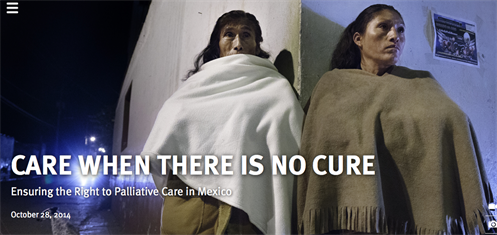Care when there is not cure
Almost 600,000 people die every year in México, nearly half of them as a result of chronic illnesses such as heart and lung disease, diabetes, HIV or cancer. Hundreds of thousands more Mexicans battle with earlier stages of these and other chronic illness. To ensure proper medical care for many of these individuals, access to palliative care and pain medicines is essential.
30 Oct 2014In México, access to palliative care services and to medicines essential for pain treatment is very limited. Human Rights Watch found that currently only a few dozen public healthcare institutions in the country offer palliative care and even fewer provide it in patients’ homes. Most healthcare personnel have received no training in the discipline, and few doctors are licensed to prescribe strong pain medicines that are essential for palliative care.

Palliative care seeks to control pain and other physical symptoms and address psychosocial and spiritual issues people with life-limiting illnesses and their families face. The World Health Organization (WHO) considers palliative care an essential part of the healthcare system and recommends that countries implement health policies to promote it, ensure adequate training of health professionals, and make essential palliative care medicines, including opioid analgesics, accessible. As palliative care does not require expensive equipment or medications it can generally be provided at a relatively low cost. A wealth of research studies has shown the effectiveness of palliative care and some studies have found that offering palliative care leads to overall cost savings for health systems due to reductions in the use of emergency health services and hospital admissions. The effectiveness of opioid analgesics, essential medicines for treatment of moderate to severe pain that are inexpensive and easy to administer, is equally proven, and in high income countries, they are widely available and used to address pain.
Doctors can lead the way to healthier drug policies – join IDHDP now.
Share this on: